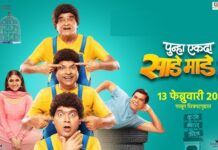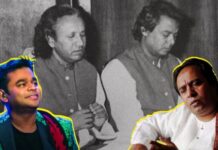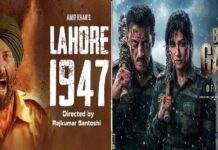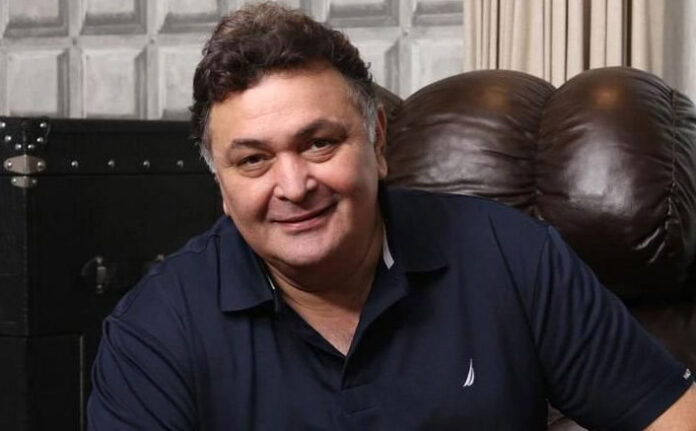INFORMATION MEETS
“I want to be the third consecutive generation of my family to bag the Dadasaheb Phalke award”
– RISHI KAPOOR
KOMAL NAHTA
Rishi Kapoor is a kid. And not just because his pet name is Chintu. But the way in which this 40-plus actor-turned-director runs away from any attempt to get him down to giving an interview, it is hardly any different from a 3-year old’s fear of holding a burning sparkler (phuljadi) in his hand. Not the one to let him get away with his “no”, you track him down to Empire Audio Centre on the last day of mixing of his first film as director, Aa Ab Laut Chalen. Amusingly, it is the film’s first reel that’s last to be mixed that morning after which recordist Anup Dev announces, “It’s over. We are through.” Chintu can’t believe it. “Really? Mera kaam khatm? Ab main kya karoonga? I’ve no work left! You mean, I can go home?” The child in Chintu has surfaced once again. Thanking Anup and the others in the room profusely for their unstinted support, he then moves out to thank everyone at Empire from owner Gaffarbhai Nadiadwala down to the office boys, shaking hands with every one of them, appreciating their efforts and support. He reveals later, “It was a very emotional moment, you know. Today is a very important day in my life. Now my job as director is over. Whatever I could do, I’ve done. Now let’s see what the public has to say about my labour of love.”
But before the people can say what they would have to say about Aa Ab Laut Chalen, you are there to know what Rishi has to say about the film and the filmmaking experience. “Nahin yaar, don’t be stupid,” he laughs. “Main kya boloon? I’m too embarrassed, chhod na! People know what kind of an actor I am — good, bad, ugly, whatever. As for the kind of director I am, what can I say? It’s my first film, let them see and decide for themselves. Forget it, yaar. I’m not too publicity-savvy, I can’t talk about myself, I’m…..” You don’t leave him, you pester him. Till he finally agrees to talk. You are happy. But your joy is short-lived. Because after every three or four sentences, Chintu tells you, “This is off-record” or “This is not for printing” or “Don’t write this” or, when he feels like being mischievous, “See, if you print this, I will hit you.”
Even though he won’t hit you, you don’t feel like letting down good old Chintu. You listen intently to what he has to say, on record as well as off record, and you realise that most of what is said off-record is about his supreme confidence in the film, its music, the performances of his cast etc. “I don’t want to sound haughty, let my film speak for itself,” he tells you while giving you the reason for speaking about so many things off-record. And so, if this interview reads disjointed, blame it on Chintu.
How does it feel to have directed a film? Is it as gratifying an experience as being an actor?
– More gratifying than that! As a director, I was totally in charge. I’ve thoroughly enjoyed myself, directing the film has been a great feeling. The whole experience is so creative. If you ask me, I’d say, every actor should become a director.
Do you mean to say that an actor is incomplete till he turns director?
– See, as a director, you’ve got so many roles to play. I’ve made Aa Ab Laut Chalen exactly the way I had wanted to. I’ve brought on screen what I had in mind. And for this, I have to thank my brothers, Randhir and Chimpu, without whom the film would not have been possible. About the film, I can say that it’s a very natural, real film. It’s a logical drama, it is what normal human beings would do in given situations. I’ve gone completely by the script. The film doesn’t have shots for the sake of shots, if they are there, they had to be there. That is why, you won’t find anything larger than life in my film. Of course, you don’t have background music in real life but my film has it. That’s because the medium of cinema requires it. Beyond these cinematic requirements, my film is as natural as can be. You may call it good, bad or ugly, but you can’t say, it’s unrealistic.
Since you are an actor yourself, did you enact the scenes to your artistes everytime?
– No, I never enacted scenes because, had I enacted them, everybody would have been Rishi Kapoor in the film! I used to only fine-tune the performances. I myself have never been a stylised actor. Like I am a spontaneous actor, I am also a spontaneous director. I never did any homework as an actor and, likewise, as a director. Of course, I had an absolutely bound script before I began shooting, but the daily shooting used to be spontaneous work.
Are you facing problems in respect of the price of your film because your hero, Akshaye Khanna’s past films have bombed?
– We’ve not sold our film on Akshaye’s name, so why blame him? Even when I signed Akshaye, he just had a Himalayputra behind him. I took him because he suited the role. In fact, all my artistes are going through professional lows but I take that as a challenge. I know one thing and that is, all of them have done tremendous work in my film, they’ve given me what I wanted and whatever was required of them. I couldn’t have asked for anything better. Irrespective of how the film fares at the box-office, I’ll say, I’m very very happy with my cast. And I may add here, the R.K. banner has always made films with conviction, not with stars. And you never know, like Soldier took a bumper opening despite Bobby Deol not being ‘hot’, Aa Ab Laut Chalen, too, may open well notwithstanding Akshaye’s past debacles. Miracles can happen.
Is there a move by distributors to seek a price reduction?
– We ourselves have voluntarily reduced the ratio from 2 to 1.75, looking to the present scenario. If one or two distributors do insist on a further price reduction, we will at least know that they are not worthy of being called our “permanent distributors”. We will not let there be any delivery tension but then we will know whom to deal with in the future. If I had the courage to show my film to all the distributors two months before release, there must be something in the film, right? I’m embarrassed to say this myself but just yesterday, my West Bengal and Bihar distributor, Sanjay Suchanti, and Rajasthan distributor, Sunderdas Sonkiya, saw the film and rushed from R.K. Studio to Empire (where I was mixing) well past midnight to compliment me. Sanjay Suchanti hugged me and started crying like a child — crying tears of joy.
Is your film a conscious attempt to target the Overseas audience in particular?
– Not at all. My story is based in a foreign land. Unlike other directors who go abroad to shoot only their songs, I had to go there because my story demanded it. The film will find identification everywhere. Everyone moves on in life for better prospects. A guy from Patna may come to Bombay to make a living, a man form Nanded may go to Pune. In my film, the hero goes from Delhi to New York. The film has an important lesson for the educated youth of India.
Do you think, the formidable R.K. banner has been a boon for you or a disadvantage?
– Definitely a boon. There is something called banner-loyalty. Aa Ab Laut Chalen is our third film after my dad’s demise. Although Prem Granth did not do well, our distributors haven’t deserted us. This is what is called banner loyalty or brand loyalty. As we brothers always tell our distributors, “We won’t leave you, may leave us if you so desire.”
What you are speaking about is banner-loyalty of distributors. Is there also banner-loyalty of the public?
– Yes, of course.
Then where was that loyalty at the time of PREM GRANTH? It took a bad start everywhere.
– Maybe Rishi Kapoor in Prem Granth was not the right choice. I was at the end of the road. The public is very smart, it can smell a film. It is likely that the public did not want to see me in Prem Granth.
Coming back to AA AB LAUT CHALEN, how many shifts have you shot it in? Has it been made in the scheduled budget?
– This is R.K. banner’s first film to have been completed so fast. I shot for just 150 days and that includes travelling and cancellations due to bad weather etc. Considering, it’s my first attempt at direction, it is creditable, I think, that I’ve not done a single day’s reshooting or even a single day’s patchwork shooting. And I might add here, my film has 18 important characters. I’ve not exposed more than 1,75,000 feet of raw stock. As for the expenditure involved, we have spent a fortune but that’s because it was the demand of the script. On the day of delivery, we will be in a deficit of over 2 crore but we are confident of our product. Besides, the film is being released in the Overseas in our account. I’m happy, there has been no wastage.
Why aren’t you having a premiere? Raj Kapoor Sahab was the showman. Doesn’t his son believe in showmanship?
– Where’s the time for the premiere? I’m mixing till today. Besides, I’m not very comfortable with premieres of my films. Maybe, I haven’t inherited this trait from my father. I can’t stand with folded hands at the exit of the cinema after the premiere show, waiting for bouquets and hoping, there’ll be no brickbats. I’m like that only, what to do? Besides, even if I had wanted to have a premiere, I’d not hold one unless it was absolutely well-planned. But yes, there will be a premiere in the USA and another one in London. And there’s one in Delhi too, but that’s a charity premiere.
Before we split, tell me, do you subscribe to the view that a film is made or marred on the editing table?
– That’s a good quotable quote, but the truth is not that. Your writing is what makes or mars your film. The script has got to be very good. I feel, my film has a lot of story material. Once you have a good script, you must make your film with confidence and conviction.
Any parting shot?
– I am working towards one goal — to win the Dadasaheb Phalke award. Both, my grandfather, Prithviraj Kapoor, and my father, Raj Kapoor, were honoured with the prestigious award, and I want to be the third consecutive generation of my family to some day bag the Dadasaheb Phalke award. My close friend and C.I. distributor, J.P. Chowksey, told me to make the Phalke award my goal, and I’ve done that…..
BABY BOY FOR GUDDU DHANOA
Santosh, wife of producer-director Guddu Dhanoa, gave birth to a baby boy on 9th January in Bombay. This is the couple’s first child and he has been christened Jeet. Incidentally, 9th January was also the wedding anniversary of Guddu and Santosh.
ZEE TO AIR EIGHT NEW CHANNELS
Zee Telefilms has announced its plans to launch eight new pay channels, including six regional channels, in the near future. The channels will be uplinked from India and will be transmitted digitally. The overall investment will be in the region of Rs. 110 crore. In the meantime, the Zee management has decided not to pursue its proposed merger with Star Network till a fair valuation of Zee Group’s business was arrived at.
The company has also announced its unaudited financial results for the third quarter ending 31st Dec., 1998, according to which the company has recorded a net profit of Rs. 14.36 crore (up 41% from the same period last year) against an income of Rs. 63.81 crore (up 21%).
M.B. SAMANT ELECTED CAA PRESIDENT
M.B. Samant was elected president of the Cine Advertisers’ Association for 1999-2000 at a meeting of its council of management held on 9th January. Ochhavlal was elected vice president, Brij Mittle, hon. secretary, and Kalgutkar, hon. treasurer. The other members of the executive committee are Satish Agarwal, Arvind Jhaveri, Chandrakant, Achal Agarwal, Garg, Balkrishna Vaidya and Mukesh Vasani.
ANJAN SHRIVASTAVA’S INTEGRATION MEET ’99
Actor and ex-MP Sunil Dutt was the chief guest at the Integration Meet ’99 on 9th January at Rang Sharda, Bandra, Bombay. Organised by actor Anjan Shrivastava and Allahabad Bank (where the actor has served for 30 years), the event was attended by many notable film personalities and other socialites. January 9 was the last day of Anjan Shrivastava’s service with Allahabad Bank.
J.P. Dutta, Amrish Puri, Danny Denzongpa, Mukesh Tiwari, Anjan Shrivastava, Kundan Shah, Bharati Achrekar, Sultan Ahmed, Ramesh Talwar, Siddharth Kak, Sanjay Chhel, Ram Mohan, K.K. Raina, Avtar Gill, Madhav Moghe, Rajeshwari, Neha Sharad, Udit Narayan and Ila Arun were felicitated. Shatrughan Sinha, MP, was also honoured at the meet. Playback singer Mubarak Begum was presented a purse of Rs. 5,000. Veteran film journalist R.M. Mishra (Cine Advance) was also felicitated. Rich tributes were paid to late lyricist Pradeep who had penned many popular songs on nationalism and national integration.
Anjan Shrivastava announced in his farewell speech that he was instituting an annual award for the best candidate of the CAIID, in memory of his late father, M.P. Shrivastava, who also served Allahabad Bank.
FIRST CONVICTION FOR VIDEO PIRACY
The Delhi metropolitan magistrate’s court has convicted a local video library owner for video piracy. Dinesh Chhabra was sentenced to a year’s imprisonment and charged a fine of Rs. 5,000 under sections 63 and 68-A of the Copyright Act. This is the first time that anyone has been convicted under the Act.
Chhabra had been found in possession of 403 unauthorised video cassettes of Hindi and Punjabi feature films, when the police had raided his video library in November ’86. The police had acted on a complaint filed by Neelakanth Shetgiri, director, Neha Films Pvt. Ltd.
The counsel for Chhabra said, the accused was a juvenile when he committed the crime, so the trial should be declared null and void. But the magistrate over-ruled the plea, stating that the accused had not produced anything on record to substantiate it.
The metropolitan magistrate remarked, “Such offences are to be taken seriously and should be considered economic offences.”
Citing a previous judgement, State of Gujarat vs. Mohan Lal and others, it was held that an economic offence is committed with cool calculation and deliberate design, with an eye on personal profit regardless of the consequences. A disregard for the interest of the community can be manifested only at the cost of forfeiting the trust and faith of the community in the system to administer justice, in an even handled manner, without fear of criticism from the quarters which view white collar crimes with a permissive eye, unmindful of the damage done to the national economy and national interest.
The judgement also quoted the Amendment Act 1965 of 1984. “There is three types of piracy — printed word, sound recording and cinematograph films. In all cases, the object is to make quick money and avoid payment of legitimate taxes and royalties.”
‘ZAKHM’ TAX-FREE IN MADHYA PRADESH
Mahesh Bhatt’s Zakhm has been granted exemption from payment of entertainment tax in Madhya Pradesh for 6 months with a maximum of two weeks per centre.
SURESH ISSAR, PUNIT ISSAR BEREAVED
Sarojini Devi, wife of director Sudesh Issar and mother of actor-director Punit Issar, expired on 13th January in Bombay. Chautha ceremony will be held today (Jan. 16) between 4.30 p.m. and 5.30 p.m. at Arya Samaj, Santacruz, Bombay.
YOU ASKED IT
Now that the Overseas market has grown so huge, will it result in Indian territorial prices of films coming down?
– The Overseas market has grown for barely 10% of the films — those starring heroes who are ‘hot’ there. So where’s the question of Indian territorial prices coming down because of that? Secondly, have you heard of anything coming down in this industry?
Is it a fact that producers are now allowed to shoot on second Sundays too?
– Yes, the Federation of Western India Cine Employees, in a meeting of its general council held on 25th November, 1998, unanimously decided to do away with the compulsory holiday on second Sundays. Producers are, therefore, now free to shoot on second Sundays.
After Mithun Chakraborty, who is the busiest actor with the maximum number of under-production films?
– Govinda and Jackie Shroff. Each of them has about 10 to 15 films under production.

DO YOU KNOW?
* Raveena Tondon is playing the female lead in top South film director Upendra’s Tamil-Telugu bilingual, titled UPENDRA. Besides producing and directing the film, Upendra will also cinematograph it, score its music and play the hero in it. Upendra’s last film, titled simply A, was a runaway hit.
* Tips, the producers of KACHCHE DHAAGE, are leaving no stone unturned to woo the Muslim population on the occasion of Idd. They have had special posters of the film (printed in Hyderabad), wishing ‘Idd Mubarak’ to all Muslims. The first batch of 5,000 attractive 30″ x 40″ posters has already arrived in Bombay for display in the circuit. Moreover, Tips have also released a special audio cassette of just the qawwali number from the film. The number is composed and rendered by late Nusrat Fateh Ali Khan. These cassettes will be distributed free of cost among Muslims mainly.
CENSOR NEWS
R.K. Films & Studios’ Aa Ab Laut Chalen, seen on 12th, has been issued C.C. No. CIL/1/4/99 (U) dt. 15-1-’99; length 4848.07 metres in 19 reels (cuts: 26.67 metres and replacement: 26.67 metres).
Warner Brothers’ (USA) Tej Raftar (dubbed), applied on 12th and seen the same day, has been issued C.C. No. CFL/2/2/99 (UA) dt. 14-1-’99; length 2679.50 metres in 5 reels (no cut). Applicant: Warner Brothers (F.E.) Inc.
Aabha Films’ Shera has been passed for adults, with cuts.
5000 Films’ Murda Ghar has been refused certificate.
Ishwar Films’ Khooni Ilaaka (re-revised) has been passed with UA certificate, with cuts.
Karishma International’s Kaala Samrajya was seen by the revising committee on 11th.
Columbia Tristar Films’ Khooni Aahat (dubbed) was seen on 13th.
Bhooshan Films’ Dracula (length 2322.30 metres in 12 reels), applied on 11th, was seen on 15th.
Film Works India’s Bombay Boys (dubbed; length 2860.29 metres in 5 reels), applied on 12th and seen on 14th, has been offered some cuts in sound.

3-E
Education-Entertainment-Enlightenment
Star Tallies
That 1999 will see the release of films of almost all the top directors is common knowledge now. Subhash Ghai, Rakesh Roshan, Sooraj Barjatya, Rajkumar Santoshi, Indra Kumar, Raj Kanwar, Dharmesh Darshan, Abbas-Mustan and David Dhawan will all have a film of theirs hitting the screens. David Dhawan, of course, may have three or even more releases this year.
And what about the heroes? Amitabh Bachchan could have four or five releases. Lal Baadshah, Kohram, Hindustan Ki Kasam, Sooryavansham and S. Raamanathan’s untitled film are all racing towards completion.
Shah Rukh Khan has Badshah, Aap Mere Hain Sanam, Josh and K. Sashilal Nair’s film (is it called One Two Ka Four?) to look forward to.
Mann, Mela, Sarfarosh and 1947 (Earth) will be Aamir’s list for this year.
Salman Khan will be seen in plenty of films. Take a look at his list: Jaanam Samjha Karo, Biwi No. 1, Hum Dil De Chuke Sanam, Hum Saath Saath Hain, Aap Mere Hain Sanam, Chal Mere Bhai and Hello Brother.
Govinda, the busiest hero after Mithun Chakraborty, may have six to right releases in 1999. Among his under-production films at various stages are Anari No. 1, Rajaji, Kunwara, Albela, Dil Ki Dhadkan, Dil Ke Aas Paas, Hadh Kardi Aapne, Hum Tum Pe Marte Hain, Shikari and Chalo Ishq Ladayen.
Anil Kapoor, who will begin his account in the new year with Hum Aapke Dil Mein Rehte Hain next week, will also be seen in Pukaar, Biwi No. 1, Taal and Bulundi for sure. His Aankh Micholi has just started but you never know, that too just might make it.
Akshaye Khanna, too, is set to start his account next week with Aa Ab Laut Chalen, to be followed by Laawaris, Dahek and Taal.
Sunny Deol will have his own directorial venture, Dillagi, releasing in 1999. His other under-production films are Arjun Pandit, Farz, Champion, Pyar Koi Khel Nahin and some more.
Bobby Deol is the other hero in Sunny’s Dillagi. Deol Jr. also has Hum To Mohabbat Karega and Salim’s untitled film due this year, besides a couple of other films, maybe.
Ajay Devgan may well have six to seven releases beginning with Kachche Dhaage. Among the seven, there will be dad Veeru Devgan’s Hindustan Ki Kasam. Then there’s Takshak, Hogi Pyar Ki Jeet, Chhalia, Aankh Micholi, Dil Kya Kare and a couple of others.
Akshay Kumar and Sunil Shetty may have five/six and seven/eight releases respectively. Mithun Chakraborty may have almost 20 in 1999! Sanjay Dutt, too, may be seen in seven or eight films this year. His first release will be Daag – The Fire.
Odd Release Due To Idd
With Idd due on 20th, almost all the releases of next week will come on Wednesday (20th) instead of the customary Thursday/Friday. With the Idd holiday on 20th and another public holiday on 26th January (Republic Day), the week may well prove to be bountiful for all the new releases. Perhaps, the dull Ramzan period that concludes on 20th and the Republic Day holiday are the two main reasons for there being four star-cast films — Aa Ab Laut Chalen, Hum Aapke Dil Mein Rehte Hain, Hu Tu Tu and Bade Dilwala — due for release next week.
Censorship And R.K. Banner
Whoever thought that the CBFC bowing down to public outcry against films after their release is a recent phenomenon must read the following:
As far back as in 1949, the certificate of Raj Kapoor’s Barsaat was changed to ‘A’ — six months after the film’s release with a ‘U’ certificate! Apparently, a lot of people objected to — believe it or not! — a scene in the film where the heroine was shown clad in a salwar-kameez but without the duppatta! Another of the showman’s many films, Awara (1951), also witnessed the changing of its certificate from ‘U’ to ‘A’ months after its release. His Jaagte Raho (1956) invited the wrath of the Sikh community which protested vehemently against a character playing with a Sikh character’s turban in the song Main jhooth bole na in the film. Jis Desh Mein Ganga Behti Hai (1960) had to be reshot, in parts, after its release because people found Padmini’s costumes and dance in the song O maine pyaar kiya too objectionable. Sangam (1964) had a similar problem — this time with Vyjayanthimala. The song, Main ka karoon Ram / mujhe buddha mil gaya, but of course! Simi’s steamy scenes were also too hard for the masses to handle in Mera Naam Joker (1970). Net result: Raj Kapoor had trouble once again after his film’s release. Even Ram Teri Ganga Maili, released with ‘U’ certificate in 1985, was reviewed on public demand, six months after its release. Subsequently, its certificate was changed to ‘UA’.
No Khandala Invitations, Please
The censors have reportedly objected to the patent dialogue of Shakti Kapoor in Zameen Ke Neeche, which goes thus: “Aati kya Khandala?”. Obviously inspired by the hit song from Ghulam, the producers must’ve never imagined that this seemingly innocuous dialogue would upset the censors, especially because the song from Ghulam was cleared without any hitch. But like one man’s food can be another man’s poison, one actor’s popular dialogue/song can be taboo for another actor. Shakti Kapoor plays a policeman in Zameen Ke Neeche and he is shown asking the question to every girl he encounters. This, perhaps, in the opinion of the CBFC, would lower the respectability of policemen in the eyes of the public. That is why, the CBFC wants this dialogue in every scene that it appears, chopped off and, perhaps, buried zameen ke neeche!
1948 Humour
A scene in Raj Kapoor’s Aag (1948) was heavily objected to by an esteemed member of the censor board, much to the filmmaker’s dismay. The showman was asked to change the dialogue where a father rebukes his son, “Tu iss gaddi par baithega?” Great confusion and a lot of explanations later, Raj Kapoor was able to finally convince the objecting member, who came from a non-Hindi-speaking community, that gaddi is not the same word as the Hindi word for a female donkey!





























